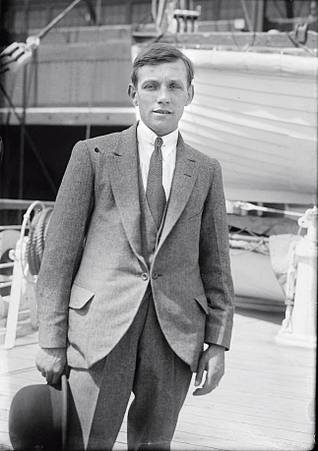
WIKIPEDIA
Undated photo of Welsh boxing champion Jimmy Wilde.
Thursday, Oct. 29, 2009 | 2 a.m.
Sun Archives
- Cotto faces test of size, sizzle (10-22-2009)
Sun Blogs
Beyond the Sun
- BoxRec: Jimmy Wilde
- Welsh Warriors: Jimmy Wilde
People come to Las Vegas from all over, and they bring their allegiances with them.
During this World Series, for example, plenty of native New Yorkers are talkin’ that street talk here in support of the Yankees, just as others are letting their Philly freak flags fly.
Transplanted fans of the Steelers, Cowboys and nearly every other NFL team show their colors in local sports books on fall weekends.
Sometimes, though, homeland loyalties emerge in more unexpected ways.
When I mentioned Jimmy Wilde, the old-time Welsh boxer, in a recent column, I didn’t think much of it. I thought he would make a good example of a fighter with a slender build who packed surprising one-punch knockout power. It was just one line in a column primarily about Miguel Cotto.
Then I heard from Ivor Price, a native Welshman and 23-year resident of Las Vegas who’s undoubtedly this city’s most passionate Jimmy Wilde fan.
Price called to make a case that Wilde, a flyweight world champion who retired from boxing in 1923 and died in 1969, is an underappreciated sporting figure in America as well as in the “old country,” as he put it.
“Unfortunately, Jimmy Wilde is mostly known and remembered by the older people in Wales,” said Price, who still retains an accent straight out of the BBC version of “How Green Was My Valley.”
“They’re always talking about Jimmy Wilde, Jimmy Wilde. It’s just too bad that the young people don’t remember him as well.”
Details about the early stages of Wilde’s career are murky. Born in Merthyr Tydfil to a coal-mining family, Wilde officially turned pro in 1910 or 1911, depending on the source.
In “Boxing’s Greatest Fighters,” author Bert Sugar wrote that Wilde might have fought 1,000 bouts, including fights in so-called boxing booths at various fairgrounds, where he took on all comers, one after the other.
Sugar described Wilde as a “physical freak, a scrawny, almost anemic-looking schoolboy with pipestem arms and skinny legs.”
Yet Wilde went on to earn the unofficial title of “greatest flyweight ever” by Nat Fleischer, and he became a member of the International Boxing Hall of Fame’s inaugural class in 1990.
In the book “In This Corner: 42 World Champions Tell Their Stories,” American bantamweight great Pete Herman said of Wilde: “He was an idol over there. They loved him.”
Before their big 1921 fight at Albert Hall, according to Herman, Wilde threatened to pull out of the bout on fight night because of a dispute regarding the weigh-in. He opted to fight only after the Prince of Wales — later to become King Edward VIII — paid him a visit in his dressing room (probably hoping to avert a riot in the hall).
“Jimmy Wilde had a tremendous record, and he was a phenomenon because he was knocking out guys who were much bigger than him,” Price said. “He was such a phenomenon that the medical authorities decided to study him and discover why he had such a knockout punch. It was actually a combination of wearing his opponent down and then striking him with that tremendous blow.
“As with anyone who comes from the old home country, I’m inclined to praise him.”
Price, 84, who served with the Royal Air Force in the China Burma India theater in World War II, met Wilde in person in 1952.
“I was in Paddington Station in London to get on the train to go back to Wales,” Price said. “He came up to me wearing a gray suit and we got into conversation. He asked if I knew who he was and I said no. ‘Why, I’m Jimmy Wilde,’ he said. He was so small and skinny, you wouldn’t have expected it, you know?”
Price, who worked with the post office in Wales and Rhodesia, moved to the United States because his wife had family here.
“We came across temporarily and decided to stay on and on,” he said.
In America, Price worked as a stagehand and had a side career as a party clown, juggler and W.C. Fields impersonator. He said he has appeared on “The Gong Show,” and the Internet Movie Database lists him as portraying Fields in 2007 on “The Next Best Thing: Who Is the Greatest Celebrity Impersonator?”
Though he’s partial to fighters from his home country, Price said he appreciates talented boxers regardless of their background.
“I like the more artistic type of boxers,” he said. “That (Floyd) Mayweather is fantastic. His moves, his anticipation, his timing. Tremendous.
“It’s a great field, boxing.”

Join the Discussion:
Check this out for a full explanation of our conversion to the LiveFyre commenting system and instructions on how to sign up for an account.
Full comments policy